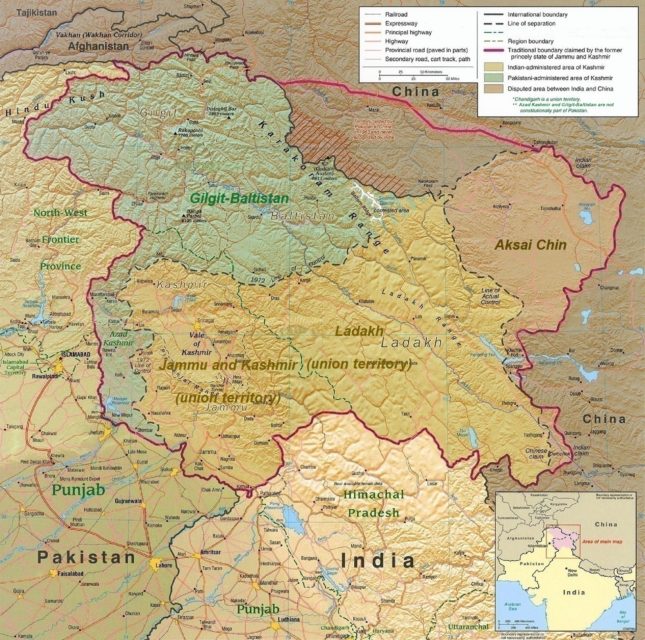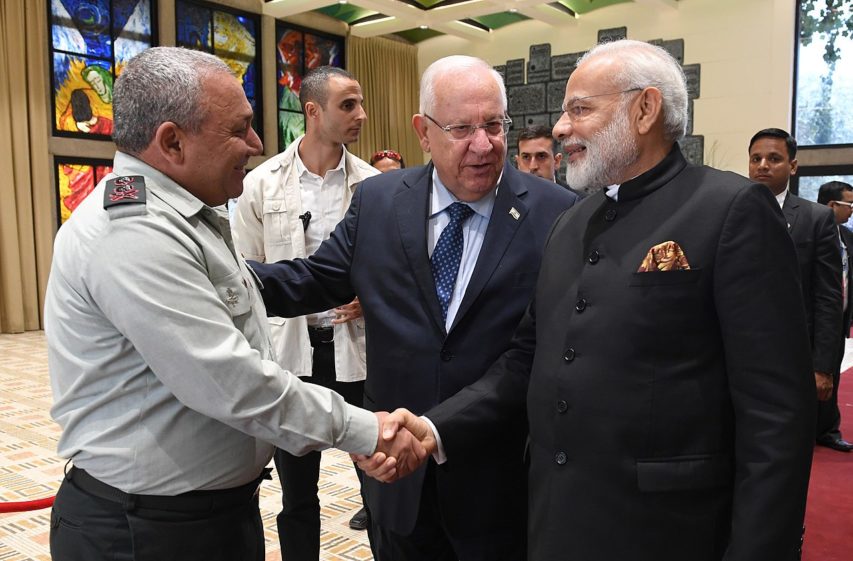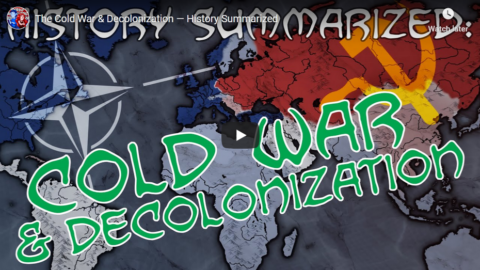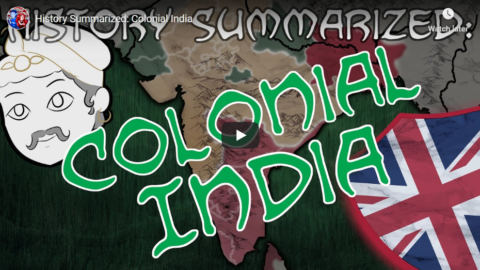TimeGhost History
Published 23 Mar 2025In 1947, the British divide the Raj into two nations, India and Pakistan, triggering one of the deadliest mass migrations in history. Sectarian violence between Hindus, Sikhs, and Muslims leaves at least 200,000 dead and displaces millions more. Hastily drawn borders turn neighbours into enemies. The partition’s bloody legacy will lead to decades of tension, war, and bloodshed.
(more…)
March 29, 2025
Why India and Pakistan Hate Each Other – W2W 015 – 1947 Q3
December 10, 2024
M47 – The Most Boring Tank Ever? | Tank Chat #178
The Tank Museum
Published Aug 9, 2024The US built M47 probably isn’t the most interesting tank in history – but it was a vital part of NATO’s Cold War tank force.
Rushed into production at the outbreak of the Korean War, it never saw active service with the US military and was quickly superseded by the M48.
But large numbers were supplied to US Allies around the world – with Germany, Belgium, Italy, Portugal, Jordan, Pakistan and Austria being among the most significant users.
Probably the most famous M47 crewman of all, Arnold Schwarzenegger, served on the tank during his National Service.
00:00 | Intro
01:05 | M46 Sees Service in Korea
02:56 | Development Problems – And a Stop Gap
10:57 | Short Lived US service
12:47 | But An Export Success
15:24 | M47 plugs the gap for the US Army – goes on to serve abroad
15:46 | The Tank Museum’s M47 Restoration Project
(more…)
November 12, 2022
Climate imperialism
Michael Shellenberger on the breathtaking hypocrisy of first world nations’ rhetoric toward developing countries’ attempts to improve their domestic energy production:
What’s worse, global elites are demanding that poor nations in the global south forgo fossil fuels, including natural gas, the cleanest fossil fuel, at a time of the worst energy crisis in modern history. None of this has stopped European nations from seeking natural gas to import from Africa for their own use.
Rich nations have for years demanded that India and Pakistan not burn coal. But now, Europe is bidding up the global price of liquified natural gas (LNG), leaving Pakistan forced to ration limited natural gas supplies this winter because Europeans — the same ones demanding Pakistan not burn coal — have bid up the price of natural gas, making it unaffordable.
At last year’s climate talks, 20 nations promised to stop all funding for fossil fuel projects abroad. Germany paid South Africa $800 million to promise not to burn coal. Since then, Germany’s imports of coal have increased eight-fold. As for India, it will need to build 10 to 20 full-sized (28 gigawatts) coal-fired power plants over the next eight years to meet a doubling of electricity demand.
This is climate imperialism. Rich nations are only agreeing to help poor nations so long as they use energy sources that cannot lift themselves out of poverty.
Consider the case of Norway, Europe’s second-largest gas supplier after Russia. Last year it agreed to increase natural gas exports by 2 billion cubic meters, in order to alleviate energy shortages. At the same time, Norway is working to prevent the world’s poorest nations from producing their own natural gas by lobbying the World Bank to end its financing of natural gas projects in Africa.
The IMF wants to hold hostage $50 billion as part of a “Resilience and Sustainability Trust” that will demand nations give up fossil fuels and thus their chance at developing. Such efforts are working. On Thursday, South Africa received $600 million in “climate loans” from French and German development banks that can only be used for renewables. The Europeans hope to shift the $7.6 billion currently being invested by South Africa in electricity infrastructure away from coal and into renewables.
Celebrities and global leaders say they care about the poor. In 2019, the Duchess of Sussex, Meghan Markle, Prince Harry’s wife, told a group of African women, “I am here with you, and I am here FOR you … as a woman of color.” Why, then, are they demanding climate action on their backs?
September 1, 2022
Rotherham Borough Council proudly announces they will be the first “Children’s Capital of Culture”
Honest to God, you can’t parody the real world harder than it parodies itself:
The news that the South Yorkshire market town of Rotherham would be the world’s first “Children’s Capital of Culture” in 2025 has been greeted by many as some kind of sick joke.
Rotherham is at the heart of England’s group-based child sexual exploitation crisis. In 2012, The Times revealed that a confidential 2010 police report had warned that vast numbers of underaged girls were being sexually exploited in South Yorkshire each year by organised networks of men “largely of Pakistani heritage”. South Yorkshire Police and local child-protection agencies were shown to have knowledge of widespread, organised child sexual abuse — but failed to act on this on-the-ground intelligence.
Rotherham borough council, South Yorkshire Police and other public agencies responded by setting up a team of specialists to investigate the reports. In 2013, an independent inquiry spearheaded by Professor Alexis Jay was launched. Her subsequent report into child sexual exploitation in Rotherham, published in 2014, made for awfully grim reading. It found that at least 1,400 children had been subjected to appalling forms of group-based sexual exploitation between 1997 and 2013. The report detailed how girls as young as eleven years of age — either in Year 6 or Year 7 of school — had been intimidated, trafficked, abducted, beaten and raped by men predominantly of Pakistani heritage.
Jay was also deeply critical of the institutional failures that had allowed organised child sexual abuse to flourish in Rotherham. The report concluded that there had been “blatant” collective failures on the part, firstly, of the local council, which consistently downplayed the scale of the problem; and secondly, on the part of South Yorkshire Police, which failed to prioritise investigating the abuse allegations. Indeed, the Jay Report found that the police had “regarded many child victims with contempt”. The inquiry discovered cases involving “children who had been doused in petrol and threatened with being set alight, threatened with guns, made to witness brutally violent rapes and threatened they would be next if they told anyone”. One young person told the inquiry that gang rape was a normal part of growing up in Rotherham. Just let that sink in — groups of adult-male rapists preying on vulnerable girls was normalised in an English minster town.
The Jay Report also took the local authorities to task for elevating concerns about racial sensitivities over the protection of the children in their care — an all-too-familiar element of the nationwide grooming-gangs scandal in England. As the Jay Report put it: “Several [council] staff described their nervousness about identifying the ethnic origins of perpetrators for fear of being thought as racist; others remembered clear direction from their managers not to do so”.
The safety and protection of the most vulnerable girls in society was sacrificed on the altar of state-backed multiculturalism and diversity politics. A recent report published after a series of investigations carried out by the Independent Office for Police Conduct (IOPC) under “Operation Linden”, found there were “systemic problems” within South Yorkshire Police that meant “like other agencies in Rotherham … it was simply not equipped to deal with the abuse and organised grooming of young girls on the scale we encountered”. South Yorkshire Police recently landed itself in further hot water after it was revealed by The Times that the police force was failing to routinely record the ethnic background of suspected child sexual abusers. For Rotherham, suspect ethnicity was missing for two in three cases.
July 15, 2021
QotD: Macaulay’s prescription for ruling India
In 1835 Thomas Macaulay had argued in his famous essay Minute on Education that “We must at present do our best to form a class who may be interpreters between us and the millions whom we govern; a class of persons, Indian in blood and colour, but English in taste, in opinions, in morals, and in intellect. To that class we may leave it to refine the vernacular dialects of the country, to enrich those dialects with terms of science borrowed from the Western nomenclature, and to render them by degrees fit vehicles for conveying knowledge to the great mass of the population.”
Macaulay was arguing that British Government should spend money on educating those it found under its rule. So it came to be as Britain ruled over the most heavily-populated and most valued part of its empire for another century.
Jawaharlal Nehru, the Prime Minister who led India to independence from Britain, studied at Trinity College, Cambridge, and at the Inner Temple, and was closely connected to the Fabian Society. Nehru’s rival, Muhammad Ali Jinnah, the founder of Pakistan, studied law at the Lincoln’s Inn, and was strongly influenced by English utilitarianism and French positivism. Nehru was an agnostic who requested a secular burial (this was denied him), while Jinnah was a gin-drinker whose religious attachments were more a matter of identity than belief.
Nehru and Jinnah led India and Pakistan to independence as the brown-skinned Westerners Thomas Macaulay had envisioned a century earlier. South Asian in appearance and pedigree, the leaders of these two nations nevertheless personified a fundamental truth about the Western orientation of the new Asian states. Pakistan was aligned with the United States, while socialist India was nominally non-aligned but clearly tilted toward the Soviet bloc. Though the populace of these nations were mostly illiterate, poor and detached from the cosmopolitan currents of the world, their elites were integrated among the English-speaking peoples. Nehru’s daughter, Indira Gandhi, attended Somerville College, Oxford. His grandson, Rahul Gandhi, whose mother is Italian, studied at Harvard and Trinity College.
Razib Khan, “Why the West lost India’s culture wars”, UnHerd, 2021-04-13.
November 3, 2020
QotD: Water pricing
Near all freshwater availability problems come from the fact that farmers get it cheap or for free, diverting it from much more valuable uses like keeping people alive if they drink it. This is true in California – we’ve actually cases of farmers using $400 of water to grow $100 of alfalfa – as it is in Pakistan. There are cases of people growing water hungry crops in near drought areas just because they get that water too cheaply.
[…]
Gaining revenue with which to build dams is useful, it most certainly is. But that’s not the only function of pricing. The cash to increase supply, great, but the very fact of charging will reduce demand. And we should be charging what it costs to produce the water too. So charges should cover 100% of the costs of the dams, not just 25%.
It’s entirely possible that charging that full cost will mean that no farmers want the water. OK, then we shouldn’t build the dam, should we? For if the value of the water – measured by what people will pay – is less than the cost of its provision, then that’s value destroying, providing the water. The dam makes us all poorer, therefore we shouldn’t build it.
The point here being – and it’s an important one – that prices affect both supply and demand. They’re what brings them into balance even. So, yes, charge for water, but not just so that we can pay to increase supply, also so that we, merely by charging, reduce demand.
Tim Worstall, “Pakistan’s Chief Justice Almost Right – Charge For Water, Not For Dams, But To Charge For Water”, Continental Telegraph, 2017-07-17.
September 4, 2020
QotD: Muhammad Ali Jinnah
Born into a Shia mercantile family, Jinnah left for England after high school, where he studied law and acquired a love for parliamentary procedure. Thoroughly and poshly anglicized (200 Savile Row suits were found in his closet after his death), he returned to India before the First World War, armed with a fearsome reputation as a barrister so brilliant judges tried to avoid him, and committed to Hindu-Muslim unity. His English was exquisite, but he spoke no Urdu. Completely secular, Jinnah was so indifferent to his religion — he drank and ate pork — that he planned Pakistan’s inauguration-day banquet as a luncheon, unaware it was Ramadan (they changed it to dinner).
Jinnah’s political intentions are hotly contested. According to New York Times Pakistan expert, Jane Perlez, many Pakistan researchers contend Jinnah had no interest in an Islam-dominated state, but “used the idea of Pakistan as a mere bargaining chip for Muslim majority rights within a loosely united post-colonial India.” With no autobiography or recollections from close friendships for our guidance, Jinnah remains a shadowy historical player, a political loner with an indeterminate goal beside Nehru, Gandhi and Viceroy Lord Mountbatten.
It is quite possible, for example, that Jinnah created the Muslim League and employed the rhetoric of Islam (slogan: “Islam in Danger”) and started wearing native clothes to harness religious fervour to political ambitions never fully articulated. But we can’t ever know, as a lifetime of chain smoking caught up with Jinnah, and he died before the first (bloody) year of Pakistan’s existence was out.
In Jinnah’s first speech to his newly minted country, though, we have this strong intentional clue: “You are free. You are free to go to your temples, you are free to go to your mosques or to any other place of worship in this state of Pakistan. You may belong to any religion or caste or creed — that has nothing to do with the business of the state.”
Barbara Kay, “A celebrated figure today could well be the condemned sinner of tomorrow”, National Post, 2018-06-05.
August 8, 2020
The Cold War & Decolonization — History Summarized
Overly Sarcastic Productions
Published 7 Aug 2020Keep safe and stylish with a Red-And-Blue facemask from Volante Design, or DONATE to help students in public schools receive high-quality masks for free — https://bit.ly/2DwE9O7
August of 2020 marks the 75th anniversary of the end of the Second World War. So I wanted to make a video about that. That was a bad idea…
What do you get when a Classically-Minded historian ventures about 2,000 years outside of their comfort zone? A mess. A well-intentioned mess is what you get. BUT a mess that we can learn from! So join me as we dig into the aftermath of the Second World War to analyze the origins of the Cold War and the decolonization of European Empires.
SOURCES & Further Reading: The Cold War by Gaddis, The Wars of French Decolonization by Clayton, British decolonization, 1946-1997 by McIntyre, The Cold War’s Killing Fields by Chamberlin, The Cold War: A Very Short Introduction by McMahon, and “Crash Course European History [Parts 42-47]” by Green.
This video was edited by Sophia Ricciardi AKA “Indigo”. https://www.sophiakricci.com/
Our content is intended for teenage audiences and up.DISCORD: https://discord.gg/kguuvvq
PATREON: https://www.Patreon.com/OSP
MERCH LINKS: https://www.redbubble.com/people/OSPY…
OUR WEBSITE: https://www.OverlySarcasticProductions.com
Find us on Twitter https://www.Twitter.com/OSPYouTube
Find us on Reddit https://www.Reddit.com/r/OSP/
From the comments:
Overly Sarcastic Productions
1 hour ago (edited)
Some clarifications:
North Africa did of course see conflict, the Pacific did get occupied — even the places that didn’t (eg: India) still paid for the war. Damn double-negatives.That weird Romania-Hungary-Russia border is a holdover from WWII. The border lasted until 1946 and was changed in 1947. Later in the video you’ll see the more familiar borders.
Indonesia declared Independence in 1945 (Like Vietnam), but the Netherlands didn’t withdraw until 1949, hence my mention of ’49.
July 5, 2020
History Summarized: Colonial India
Overly Sarcastic Productions
Published 4 Jul 2020Start your free trial at http://squarespace.com/overlysarcastic and use code
OVERLYSARCASTICto get 10% off your first purchase.Indian History has always been a story of peoples coming and going, but the subcontinent’s modern history takes that up to 11, with the arrival of Central Asian Mughals and boatloads of Europeans. See how India transforms from Medieval to Modern in this final act of our History of India.
SOURCES & Further Reading: The Discovery of India by Jawaharlal Nehru, A History of India by Michael H. Fisher (a lecture series by The Great Courses).
This video was edited by Sophia Ricciardi AKA “Indigo”. https://www.sophiakricci.com/
Our content is intended for teenage audiences and up.Special thanks to Varda Alighieri for coaching me through my (hopefully serviceable) pronunciations!
PATREON: https://www.Patreon.com/OSP
MERCH LINKS: https://www.redbubble.com/people/OSPY…
OUR WEBSITE: https://www.OverlySarcasticProductions.com
Find us on Twitter https://www.Twitter.com/OSPYouTube
Find us on Reddit https://www.Reddit.com/r/OSP/
June 23, 2020
Pushback for Chinese aggression in the Himalayas
In Quillette, Cleo Paskal outlines the Chinese military action last week and a few of the reactions in civil society:

The western portion of the Line of Actual Control, separating the Eastern Ladakh and Aksai Chin (map by CIA). In the Demchok sector, only two claim lines are shown. The line was the focus of a brief war in 1962.
Wikimedia Commons.
High in the Himalayan mountains, Chinese soldiers ambushed Indian troops this week, resulting in a brutal battle on the Indian side of their shared border. Twenty Indians were killed, while China won’t disclose its losses. It was the deadliest confrontation on the border in over 40 years. As a result, some Indian strategists are openly discussing recognizing Taiwan and providing more visibility to the Dalai Lama, state-owned telecoms are blocking Chinese equipment from 4G upgrades, and millions of Indians downloaded an app that helps remove Chinese apps from their phones (before Google removed it). All of this comes at a time when much of the world remains angry at China’s leaders for their initial handling of the COVID-19 crisis.
This week’s apparent provocation is part of a larger recent pattern with China. From the South China Sea, to Taiwan, to Hong Kong, Beijing has been seeking to change facts on the ground in a way that benefits its own strategic and economic interests. In a recent Atlantic Council discussion of the India-China border issue (convened before the latest fighting), senior American diplomat Ambassador Alice Wells summed the situation up well: “There’s a method here to Chinese operations. [A]nd it is that constant aggression, the constant attempt to shift the norms, to shift what is the status quo, that has to be resisted.”
For decades China has tried to expand its strategic reach along its de facto south-western border through the invasion of Tibet, land swaps with Pakistan, and war with India. To this end, China treats British Empire-era maps as political props to variously brandish or dismiss, as best suits Beijing’s goals. For example, it effectively accepted the 1914-era McMahon Line delineation in its border agreement with Myanmar, but rejects it with India.
The Line of Actual Control (LAC) separating China and India runs through rugged, high-altitude terrain that has witnessed multiple conflicts going back to the 1962 India-China border war. In recent weeks, there have been Chinese incursions at several points along the LAC, reportedly involving thousands of troops. In some spots, the Chinese military is digging in on the Indian side, while expanding its already considerable support infrastructure on their side of the LAC.
Delhi is particularly concerned about Chinese advances near India’s Daulat Beg Oldie (DBO) high-altitude military airfield, an essential Indian forward base that provides oversight of the strategic Karakoram Highway (KH) linking China’s western Xinjiang Autonomous Region with Pakistan, including the Gwadar Port on the Indian Ocean. It is a key component of the multi-billion-dollar China-Pakistan Economic Corridor.
January 10, 2020
QotD: Deciding what is “newsworthy”
[…] the ripples of battle in their formal sense are guided by the presence of historians, and that means originally Westerners, and more recently in large part Europeans and Americans. And such distortions do not always play out in bias toward Westerners, especially in the present age. In April 2002 the Israeli Defence Forces entered the West Bank community of Jenin to hunt out suspected suicide-murderers, whose co-members had blown up hundreds of Israeli civilians over the prior year. Although fewer than sixty Palestinians were killed in Jenin — the great majority of them combatants — the world media seized upon the street fighting, dubbing it “Jeningrad” as if they were somehow the moral equivalent of one million Germans and Russians lost at Stalingrad. Yet just days after the Israeli withdrawal from Jenin, Pakistan squared off against India. The stakes were surely far higher: One-fifth of the world’s population was involved. Both sides were nuclear powers and issued threats to use their arsenals. In the prior year alone nearly four times more Indians and Pakistanis were killed than Palestinians and Israelis. By any calculation of numbers, the specter of the dead, the geopolitical consequences, or the long-term environmental health of the planet, the world should know all the major cities in Kashmir rather than a few street names in Jenin. And if the world sought to chronicle destruction and death in an Islamic city, then by any fair measure it should have turned its attention to Grozny, where an entire society of Muslim Chechnyans was quite literally obliterated by the Russian army.
The idiosyncracies of historical remembrance of battle do not hinge alone on the presence of a Socrates or Teddy Roosevelt in the ranks. Sometimes there are wild cards of culture and politics as well. In this case and at this time, the fact that Israelis fit the stereotype of affluent and proud Westerners abroad while the Palestinians were constructed as impoverished and oppressed colonial subjects brought to the equation the sympathies of influential Americans and Europeans in the media, universities, and government — the prominent and sometimes worrisome elites who determined to send their reporters, scholars, and diplomats to Jenin rather than to Islamabad or Grozny.
Victor Davis Hanson, Ripples of Battle, 2004.
November 30, 2019
QotD: Comparative advantage
Business schools, which focus naturally on the fortunes of the individual firm, teach that “competitiveness” is all. They believe it follows that government, not price signals from the world economy, should choose winners. The economists in the business schools have had hard time persuading their colleagues that the pattern of trade and specialization is determined, on the contrary, by “comparative advantage,” which has nothing to do with absolute advantage, and which professors of management and of history regularly mistake it for. Pakistan exports clothing to the United States, the economists preach (without much effect on editorial boards and politicians), not because it is better per hour at making socks and sweaters but because it is comparatively better at them than at making jet airplanes and farm tractors.
Deirdre McCloskey, Bourgeois Equality, 2016.
November 23, 2019
QotD: Populism and democracy
As I have previously confessed, I became a Tory at the age of six. This was riding home from St Anthony’s, on the crossbar of our family servant’s bicycle, through an angry crowd in Lahore. He’d been sent to fetch me from danger. This beloved man, Bill, whose turban revealed him to be a Christian, chose a long route home, to skirt the crowd. But there was no avoiding them, and in the course of our wild ride, I distinctly remember blood and corpses. The crowd was demanding, as I recall, death for the hostages from a hijacked Indian aeroplane, but in the absence of its intended victims, began taking its violence out on itself. Yairs, a lurid spectacle.
I was not so precocious: it took me twenty more years to sort out what I might mean by the word “Tory.” But the view itself began in Hobbesian fear, that day, with my discovery that “the people” stink. They are mindless animals, and put some wrath in them, they will lose their bashfulness. And of course, not only in West Pakistan; for gradually one makes the further discovery that “the people are the people are the people” everywhere. They need to be tamed, cautioned, repressed, sometimes caged. My response to misty-eyed rhetoric for “democracy” is unfavourable. “Populism” is, in my sight, unambiguously evil — even when its cause be, for the moment, just. Given more time, and the inevitable failure to achieve immediate goals, the cause itself will turn rancid.
David Warren, “Crowds & powers”, Essays in Idleness, 2016-11-08.
May 25, 2019
India’s “Modi generation”
Mihir Swarup Sharma discusses the demographic, political, and social impact of India’s most influential generation:

Israeli President Reuven Rivlin and IDF Chief of General Staff Gadi Eizenkot meet with Indian Prime Minister Narendra Modi, in Jerusalem, July 5, 2017.
Photo by Mark Neyman / GPO via Wikimedia Commons.
The Modi generation, which is and will be India’s most influential ever, will reshape this country the way that other demographic bulges — think of the US’ Baby Boomers — have done so elsewhere. Their India will be substantively different, in terms of domestic and global politics, than that which has come before.
What might this India look like? First, it will be impatient. Young people are less willing to wait for national glory. In the People’s Republic of China, the rule for the country, set by Deng Xiaoping, was to “bide your time and hide your strength”. Xi Jinping’s China, where the agenda is being set to appease a generation of young single men, has abandoned Deng’s maxim. This will be even more true for India, which is after all a democracy that must respond to the most powerful voting bloc in its history. It will be impatient about economics as well. Young Indians expect a better life soon. Today they are willing to give Modi some more time to achieve it. But, in the years to come, that patience will run out.
Second, it will be aggressive. India can no longer “hide its strength”. That was the lesson we must take from the political salience in this election of Balakot, of the promise by the ruling party to enter their houses and kill India’s enemies. A national machismo is the natural consequence of a bulge of young, unemployed and unemployable men. India is perhaps less able to sustain this aggressiveness than, say, China. But the times in which India would be able to absorb terrorist attacks, for example, without a major pushback have passed.
Third, it will be a risk-taker. Young people have a belief in their own invincibility, and Indian policy will be forced to reflect this. Others might argue demonetisation was a foolish mistake; but what matters to many voters is that Modi took a risk, and according to them in a good cause. The Balakot air strike on Pakistan may not have achieved a fundamental strategic transformation of the India-Pakistan relationship (though some experts disagree) but it played well politically because it was not just a demonstration of strength as a nation, but an example of a tolerance to risk. In this sense, the notion of Indian leadership has become one of risk-taking; Manmohan Singh was pilloried for caution and “silence”, Modi is considered an epochal leader because he takes risks.
March 4, 2019
QotD: Gandhi and the partition of India
Anyone who wants to wade through Gandhi’s endless ruminations about himsa and ahimsa (violence and nonviolence) is welcome to do so, but it is impossible for the skeptical reader to avoid the conclusion — let us say in 1920, when swaraj (home rule) was all the rage and Gandhi’s inner voice started telling him that ahimsa was the thing — that this inner voice knew what it was talking about. By this I mean that, though Gandhi talked with the tongue of Hindu gods and sacred scriptures, his inner voice had a strong sense of expediency. Britain, if only comparatively speaking, was a moral nation, and nonviolent civil disobedience was plainly the best and most effective way of achieving Indian independence. Skeptics might also not be surprised to learn that as independence approached, Gandhi’s inner voice began to change its tune. It has been reported that Gandhi “half-welcomed” the civil war that broke out in the last days. Even a fratricidal “bloodbath” (Gandhi’s word) would be preferable to the British.
And suddenly Gandhi began endorsing violence left, right, and center. During the fearsome rioting in Calcutta he gave his approval to men “using violence in a moral cause.” How could he tell them that violence was wrong, he asked, “unless I demonstrate that nonviolence is more effective?” He blessed the Nawab of Maler Kotla when he gave orders to shoot ten Muslims for every Hindu killed in his state. He sang the praises of Subhas Chandra Bose, who, sponsored by first the Nazis and then the Japanese, organized in Singapore an Indian National Army with which he hoped to conquer India with Japanese support, establishing a totalitarian dictatorship. Meanwhile, after independence in 1947, the armies of the India that Gandhi had created immediately marched into battle, incorporating the state of Hyderabad by force and making war in Kashmir on secessionist Pakistan. When Gandhi was assassinated by a Hindu extremist in January 1948 he was honored by the new state with a vast military funeral — in my view by no means inapposite.
Richard Grenier, “The Gandhi Nobody Knows”, Commentary, 1983-03-01.







